Rosacea is a damaging and embarrassing skin condition that worsens as the years pass. It causes red, inflamed skin and the appearance of blood vessels due to the thinning and stretching of the skin's layers. Collagen injections originally were available to treat damaged collagen, and as scientific research developed, the cosmetic injections evolved to help improve the appearance of wrinkled skin. Although collagen is the most supportive and strengthening component of human skin, there is not much support to prove that collagen treatments will be very helpful in treating rosacea.
Rosacea
Rosacea appears in phases: pre-rosacea, a tendency to flush easily; vascular rosacea, small vessels in the face become visible in the surface of the skin; and inflammatory rosacea, small bumps and red pustules appear on the surface of the face. Signs and symptoms of rosacea include flushing and persistent redness, bumps and pustules with visible blood vessels, and burning or stinging with dry appearance and swelling of the skin. Doctors at the University of California San Diego have found elevated levels of enzymes and peptides that cause the symptoms of rosacea, different from the bacteria at the source of acne, which was originally thought to be much the same as rosacea. Rosacea is scientifically treated with antibiotics, without the topical treatments of ointments and creams that often sooth other skin disorders.
Collagen
Collagen is a protein found in over 25 percent of the body, often referred to as the strengthening block that holds your body together. A network of collagen, elastin and keratin support nearly every cell in your body. So it's no wonder that even the skin relies on collagen for strength and flexibility, which is why you hear so much about cosmetic procedures and injections of the skin.
Collagen Injections
Collagen injections became available in the 1970s to rebuild damaged collagen in joints and other internal locations. After further research and development, cosmetic injections became available later in the 1990s to help approve the appearance of wrinkled skin, crow's feet, frown lines and other facial aging. Over the last 10 years, the popularity of collagen has decreased dramatically, with the increase of other superficial, fast-acting cosmetic injections.
Collagen for Rosacea
Collagen is both a filler and stimulator for the skin, or a strengthening block. It has been found that as rosacea develops with age, the collagen networks of the skin weaken; however, collagen injections are not considered a treatment for rosacea. Therefore, a natural collagen supplement may be valuable to individuals suffering with rosacea in addition to the medications prescribed to cure the disease.
Topical Collagen Treatments
Collagen-firming lotion may help the strength and structure of the skin of rosacea sufferers. Look for lotions that contain keratin, which is important to stimulating the body's own collagen and elastin, helping to strengthen the collagen network that weakens as rosacea worsens in stages.
Related Articles
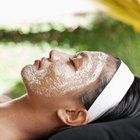
Skin Creams That Penetrate

List of Retinoids
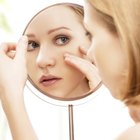
Skin Care Products That Contain ...

Amino Acids to Get Rid of Acne Scars & ...
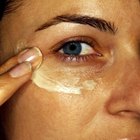
The Best Facial Moisturizers for People ...

Benefits of Shea Butter and Coconut Oil ...
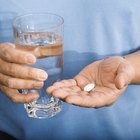
L-Arginine & the Skin

Can Age Spots Be Reversed?
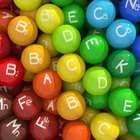
What Vitamins Help the Liver?

The Best Vitamins for Sinuses

Removing Acne Scars With Tretinoin Cream

Elastin Supplements
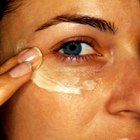
Alternatives to La Mer Creme

What Is Palmitoyl Oligopeptide?

Urea & Acne

How do I Speed Up the Reversal of Face ...

Cleansers for Rosacea That Unclog Pores

What Are the Benefits of Coconut Milk ...

Glucosamine: Skin Benefits

Homeopathy Cure for Stretch Marks
References
Writer Bio
Sara McIntosh is a quality assurance editor in Cincinnati. She has been freelance writing since 2008. McIntosh holds a Master's degree in English from Xavier University. She primarily writes eHow articles for Demand Studios.